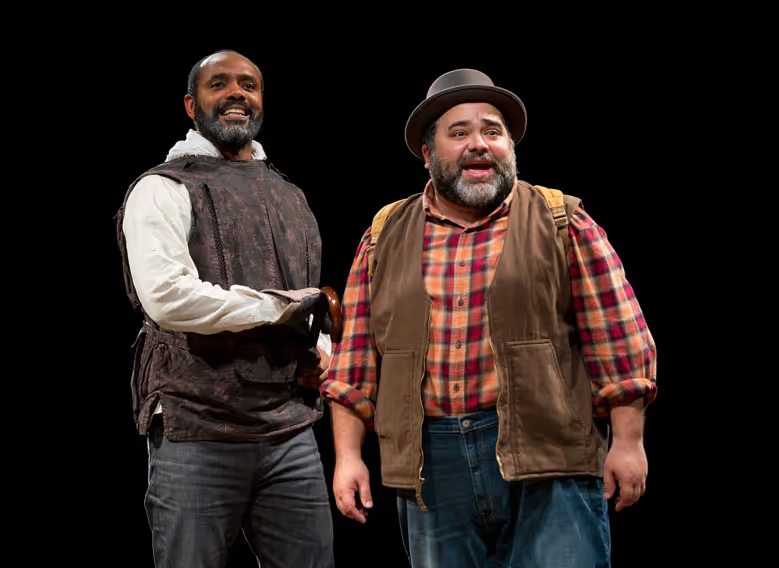Marriott's 'Man of La Mancha' is one impossible dream realized
If Chicagoland musical theatre aficionados’ summer calendars do not already include entries for Marriott’s Man of La Mancha, those sins will be immediately rectified or said patrons ought be sent to the high inquisitor.
This genius, life-affirming production is so worth a couple indoor hours (one hour, 45 minutes, no intermission, to be exact) even on summer’s most perfect afternoon or evening. Yes, 78 degrees and sunny with a gentle wind is an all-too-uncommon happenstance in these parts. Shows of this brilliance of depth, imagination and execution are even rarer.
That’s not to say Director Nick Bowling‘s Man of La Mancha is some whimsical summer breeze. It is a stark, gritty, heart-wrenching, modern musical fictionalization of Miguel de Cervantes Don Quixote, as performed by the book’s imprisoned author and unseemly cellmates, all awaiting the Spanish Inquisition.
“My man of La Mancha is not Don Quixote; he is Miguel de Cervantes,” book writer Dale Wasserman has said about his idea for Cervantes’ Quixote to be played by Cervantes himself. “The two would progressively blend in spirit until the creator and his creation would be understood as one and the same.”
Enter Nathaniel Stampley, whose strong and emotional characterizations of Cervantes and Quixote tenderly, confidently remind each person it’s his or her responsibility to leave the world a better place because of their time spent here. There are simply not strong enough superlatives for this production’s leading man, at least until August, when “Jeff Award nominee” is added to his resume or there ought to be an inquisition of a different type.
Stampley certainly leaves his mark on the most well-known pieces in Mitch Lee‘s (music) and Lee Darion‘s (lyrics) sweet, funny and emotionally robust songbook. From his strong, playful “Man of La Mancha,” to his dulcet “Dulcinea” and showstopping, “The Impossible Dream,” Chicagoland’s patrons are treated to Stampley’s vocal prowess already well known on Broadway (The Gershwins’ Porgy and Bess, The Lion King and The Color Purple), the West End and throughout the country.
His excellence is matched throughout this luminous cast.
One of Chicagoland’s brightest new stars, Danni Smith, plays such a badass Aldonza that orange is not the new black unless and until she says it is. Her impeccable vocals are particularly evident in “Aldonza,” and her final acceptance of the name given lovingly to her by Quixote (and all that goes with it) is a particularly poignant reminder of love’s infinite power.
Hilarious Richard Ruiz is Stampley’s perfectly cast sidekick and comic foil, Sancho, whose “A Little Gossip” is just delightful.
And then there’s the tight ensemble, the most in sync opening night cast in recent memory. Perhaps that’s because each of them is on stage throughout the entire performance, telling Man of La Mancha through the eyes of their prisoner characters, Don Quixote through the characters Cervantes gives them and, most splendidly, both of the above, simultaneously.
They dance, they act, they play instruments and are wont to break into an occasional folk song (“Little Bird, Little Bird”) or rousing all-cast number (“I’m/We’re Only Thinking of Him” and others). Fully deserving their nightly bows: Jonathan Butler-Duplessis, Lillian Castillo, Bobby Daye, James Harms, Andrew Mueller, Matt Mueller, Cassie Slater, Craig Spidle and Brandon Springman.
And finally, visually supplying the dirty prison aura is Jeffrey D. Kmiec‘s minimalist set of a linoleum-look floor and multi-use benches, along with Nancy Missimi‘s grunge wardrobing. It’s all shown off by Jesse Klug‘s exquisite lighting design, featuring harsh prison fluorescents juxtaposed with softer theatrical lighting when the Quixote tale unfolds. Music Director Ryan T. Nelson‘s orchestra is up to Marriott’s usual high bar expectations.
For certain, this Man of La Mancha is not to be missed and has taken a rightful place in this reviewer’s “Top 10” musical theatre productions experienced. Bowling’s ability to strip away other versions’ sentimentality allows the tension between reality and illusion to take center stage. And when it does, we find the line separating the two is a blurred one, indeed.











